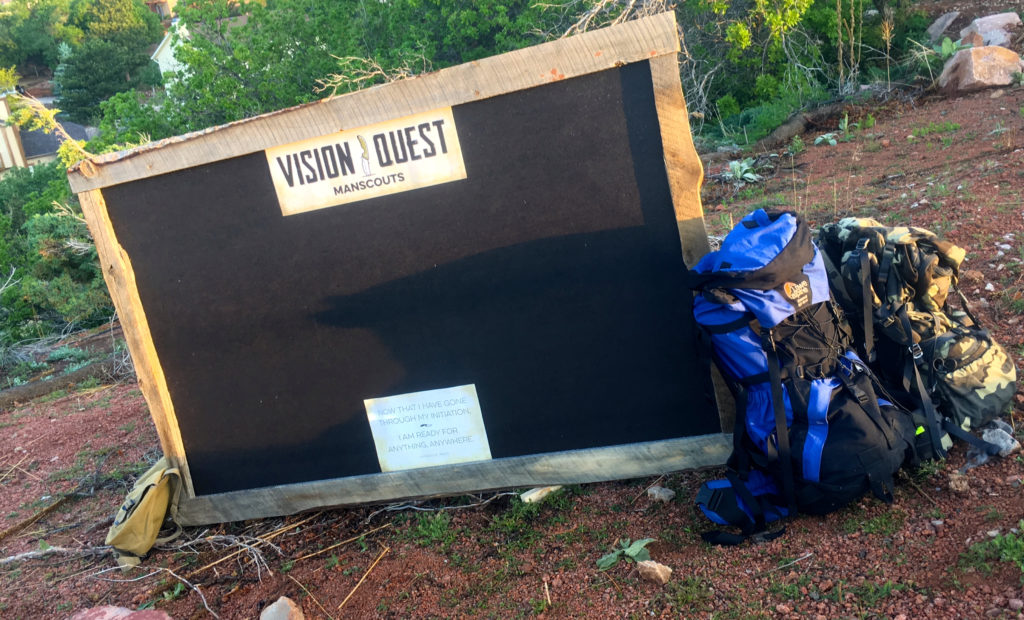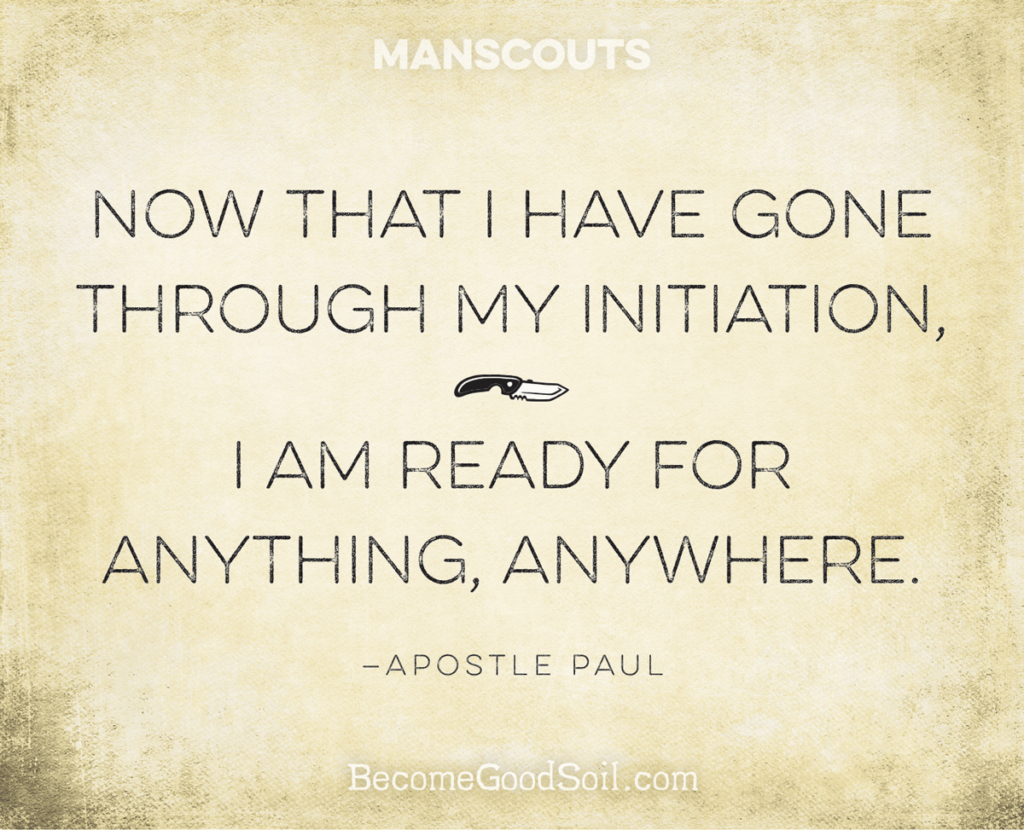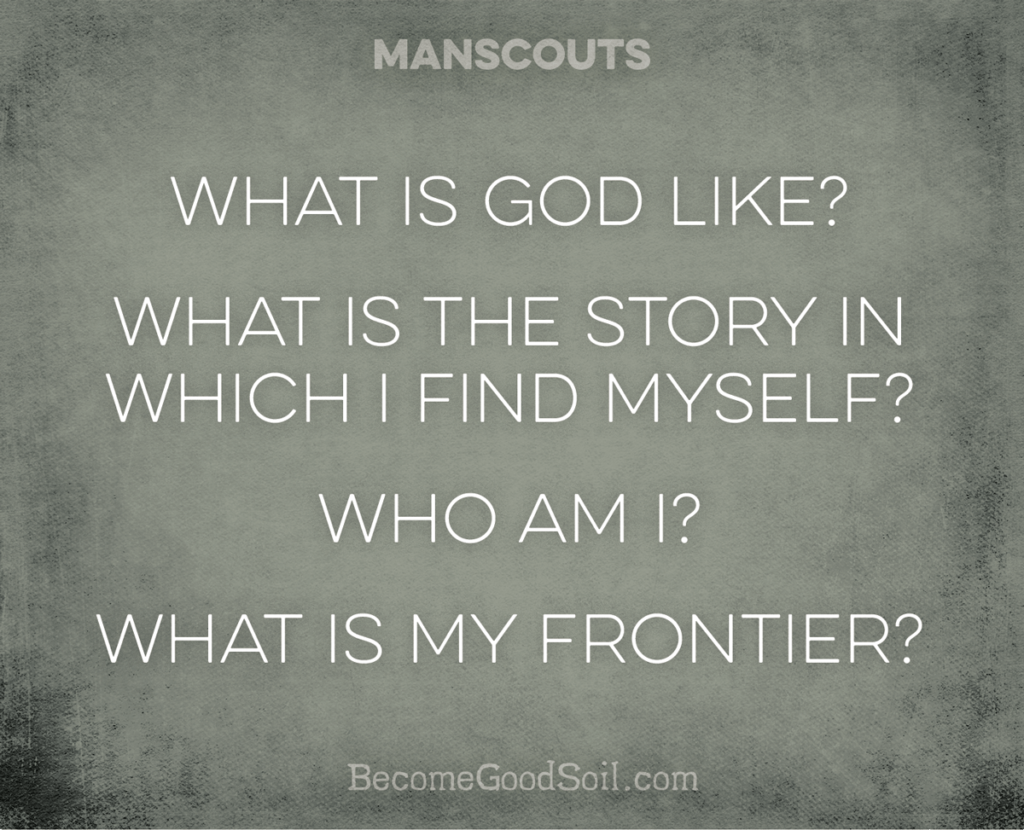And nothing could stop his joy. After years of practice, years of training and years of consenting to something we can only name as initiation, he had become the kind of man whose joy and confidence and gratitude was no longer dependent upon either circumstances or outcomes.
When we consider Paul's story, we see that he'd been immersed in the Reality of God and His Kingdom through both personal Divine encounter on the road to Damascus and an ongoing process which included fourteen years of which we know nothing of his life. Put simply, over time, he had been completely transformed. It is from this place he penned a letter to the followers of the Way, articulating this inextinguishable connection to God.
No man has made a more provocative declaration. Paul invites us into his soul.
I know how to live on almost nothing or with everything. I have learned the secret of living in every situation, whether it is with a full stomach or empty, with plenty or little. For I can do everything through Christ, who gives me strength. (Phil 4:12-13)
Here's Peterson’s paraphrase of this passage in The Message:
I’ve learned by now to be quite content whatever my circumstances. I’m just as happy with little as with much, with much as with little. I’ve found the recipe for being happy whether full or hungry, hands full or hands empty. Whatever I have, wherever I am, I can make it through anything in the One who makes me who I am.
When I pause to consider the essence of masculine initiation and the reality of how Paul practiced, trained, and learned this way of being with God—wholehearted—in the world, I am drawn to this application (or paraphrase, if you like) of Paul's text originally penned by Richard Rohr. Here's how it captures a vision of the initiated masculine soul:
Now that I have gone through my initiation,
I am ready.
For anything.
Anywhere.
You see, over a decade of training after his well-known “conversion,” Paul had become the kind of person who was deeply convinced of the reliability of God and His Kingdom.
In particular, he'd grown in confidence that an experiential process of initiation is available, one that can be trusted to effectively connect the human spirit with the active life of God. It was clear from Paul's life that the fruit of consenting to the process of initiation is a robust well-being that transcends both the best and worst of circumstances.
In other words…
Now that I have been so immersed in the true nature of God and His Kingdom,
Now that I have thoroughly put to death the self-sufficiency and self-preservation of the false self,
Now that I have been resurrected and restored into my true self,
Now that I have become, in my essence, what God meant when He meant man,
Now that I have become uniquely who God meant when He meant me,
Now that I have trained and become practiced in living a life in experiential union with God Himself,
Now that it is no longer the separate-I who lives, but the very breath, strength, and life of God-with-me who lives in me,
I am ready.
Ready for anything, anywhere.
I have passed through the death of my small life.
Rather than resisting death, I have endured the sting of death and discovered the truth that death cannot annihilate what is most true about my masculine soul, about who I truly am.
And now I live.
I really live.
I've been initiated by my Father to live in union with Him in a storied Reality that includes and transcends every other story in my life.
I have been initiated, in part, through completing a quest. A Vision Quest for the masculine soul.

Here's why this is absolutely central to the masculine soul.
Almost every culture predating the modern world had a process of initiating boys into men. In some cultures, male initiation was intentional, deeply ritualized, and publicly celebrated. In other cultures, male initiation precipitated indirectly but with equal effectiveness because the survival of the culture depended upon it.
- Sparta 800 B.C.—At age seven, boys left their families to participate in boarding schools where both their strength and their resolve was tested.²
- In Iron John, Robert Bly reminds us, "... The traditional ways of raising sons, which lasted for thousands and thousands of years, amounted to fathers and sons living in close—murderously close—proximity, while the father taught the son a trade; perhaps farming or carpentry or blacksmithing or tailoring…”
- The first boy's initiation among the Maasai tribe in the Republic of Kenya is known as Enkipaata (pre-circumcision ceremony). “[Initiation] is organized by fathers...when the senior warriors are settled. A delegation of boys, aged 14 to 16 years of age, would travel across their section of land for about four months...The boys are accompanied by a group of elders spearheading the formation of a new age-set…The boys across the region will be united and initiated…The day before the ceremony, boys must sleep outside in the forest...Once the boys become warriors they resume responsibility of security for their territory.³
It has been said that necessity is the mother of invention. So it is with male initiation. In historical eras when most of a community's effort was focused on securing food, clothing, shelter, and safety, the survival of a community depended on the hearts of its members being able to live beyond their own self-interest; the survival and flourishing of an individual apart from his people was as inconceivable as it was impossible. A mantra of “each man for himself” was untenable. Each man had to be for the whole, not only for the self. The heart of the warrior willing to spend himself on behalf of the good of the whole was essential.
We live in different times. Every age faces unique challenges and assaults against the flourishing of the human soul. And every age offers a unique possibility for salvation as whole people, both individually and communally.
For thousands of years, Aboriginal boys living near Kojunnup, “the place of the stone ax” in Australia, were led out at the conclusion of their initiation rite to create a stone axe. Returning to the community with axe in hand, they embodied a new reality that they were also soulfully equipped to wield “power on behalf of the good of the community.”⁴
Backed by the prooftext of history, I offer a bold proposition:
The lack of consistent and intentional male initiation is one of the most destructive omissions of our age.
It is why, when we look around in our stories and upon the earth, we can see the devastating impact of uninitiated men accumulating power that is not wielded for the good of the community.
“What we have now is a world of uninitiated men. Partial men. Boys, mostly walking around in men’s bodies, with men’s jobs and families, finances, and responsibilities. The passing on of masculinity was never completed, if it was begun at all. The boy was never taken through the process of masculine initiation.” John Eldredge, Fathered by God
But this
is not the final word.
I am banking much of my life on this idea as well:
The Father’s ongoing initiation of the masculine soul has the final word. And inviting us and guiding us through this process of masculine initiation is mostly what God is up to in the life of every man.
In every great story, there is both a rescue and a way back to life.
And as Dallas reminds us, God is perfectly capable of saving the world He created. He is at work, here, today.
I want to suggest that one of the primary ways God is saving the hearts of men, the earth, and all of humankind is through reconstituting patterns of male initiation and specifically, particularly, around the centerpiece of the Vision Quest.
Without a vision, the people perish (Proverbs 29:18).
To be precise, without a revelation, without an intimate heart-knowing of Reality, the human heart will suffer deeply.
The Vision Quest was intended to be the heartbeat of the journey a boy took through his early years, his teenage years, and into manhood.
And it is a journey that empowers the masculine soul to grow and mature into full manhood, empowering a man to live from a Source beyond himself for the good of the whole community.
It is a journey that cannot be fast-tracked or industrialized.
Yet it is a journey available to every man in every season—if he is willing to respond to God’s invitation.
The Vision Quest is the path to becoming the kind of man who can say with confidence,
I am ready.
For anything, anywhere.
In its essence, the Vision Quest is a God-led, God-bathed, God-initiated process that requires both our response and our interactive participation.
It is a story that both transcends and includes every other story of our life.
And it is a quest that can sufficiently speak to—among other things—four deep questions of the masculine soul:
What is God like?
Walter Bruggemann came to the conclusion that "God is wild, dangerous, unfettered and free." Tozer took it even deeper, suggesting that "God is a person, and in the deep of His mighty nature He thinks, wills, enjoys, feels, loves, desires and suffers as any other person may." What is God really like? What is His nature, personality, quality, and Way?
What is the story in which I find myself?
G. K. Chesterton said, "We live in narrative, we live in story. Existence has a story shape to it. We have a beginning and and end, we have plot and characters..." What is that Story, the nature of Reality?
Who am I?
Chesterton also said that “we are all under the same mental calamity; we have all forgotten our names. We have forgotten what we truly are.” What does it mean to be made in the image of God, as a man? How do I uniquely bear the image of God? It is only by wrestling with this deeply soulful question that we will become who we were born to be.
What is my frontier?
Howard Macey offers the idea that “the spiritual life cannot be made suburban, it is always frontier. Those who choose to live in it must not only accept it, but even rejoice that it remain untamed.” If we are being made ready to be entrusted with God’s Kingdom to rule for all of eternity, what preparation and training has He appointed for this season and this story? What is this personal soul-forging edge of my journey toward integration and union with God?
Central to the heart of the Father is to beckon the boy forward through exploring these four questions and, through active exploration, to become as Jesus was: a man who grows in wisdom, stature, and favor with God and man.
It is through engaging in a Vision Quest and completing our initiation that we become whole-hearted men.
The boy will become like Paul and Nehemiah and Joseph and Jesus Himself. In spite of unprecedented challenges, he will become like a few others who, in each age of human history, have become initiated men.
The boy will become the kind of man who can say,

How will you respond to the Father’s leading and invite the boys in your home and redemptive community deeper into this Vision Quest?
We cannot offer what we have not become. Therefore, perhaps the more central question we must be asking is this:
How will you respond to the Father’s invitation to the boy within your own soul to be led by Him through the initiation process of your masculine soul?
Let an honest, interactive consideration of these four questions, over time, be a possible next step.
The choice is yours.
The world depends on it.
It’s always been so.
There is a way that is available. It’s an ancient path being rediscovered afresh in every generation.
God is perfectly capable of guiding you into initiation if this is what you want.
He is the initiator. And we are the ones invited, beckoned to respond to this wild love.
He is kind to wait for the question and desire for initiation to arise in the heart. He’s too kind to push. Instead, He waits, as Tozer says, to be wanted. Simultaneously, we can trust the particular pressures of both pleasure and pain in our stories to draw forth desire, for Love is determined to to see us all into full maturity (Ephesians 4:1-13).
Father, I want to be initiated.
I want to become the kind of man who, like Paul, is able to proclaim in defiance of his enemies:
“I have learned to be content in whatever the circumstances. I know what it is to be in need, and I know what it is to have plenty. I have learned the secret for being content in every situation, whether well fed or hungry, whether living in plenty or in want…”
“Now that I have gone through my initiation, I am ready for anything, anywhere.”
I invite You to lead me into what’s next in my initiation. And through my initiation, to become the kind of man who can shepherd the initiation of others.
I want to suggest that these four questions are the some of the most fundamental operation beliefs shaping our lives. The Good News is that they're dynamic, and over time, our journey into them can align with Reality and mature into good soil and deep roots.
Here is a place to start. Pause here. Write down these four questions:
Who is God?
Who am I?
What is the story?
What is my frontier?
Let your life speak. Observe your internal world and your external actions over the last hour, the last day, and the last year. How would you begin to put words to these four questions, based on your observation? Notice the distinction between what you say you believe contrasted with the practical reality of what your life reveals about what you believe. Ask God what He wants to say to you in this place.
For those of you with sons, ask the Father how to lead you in allowing these questions serve as a central orientation for their process of initiation.
(1) James Finley offers this question in his teaching on centering prayer.
(2) Times Magazine, "The Many Ways Society Makes a Man," September 26, 2017
(3) Maasia-Association.org
(4) Adam's Return, by Richard Rohr

